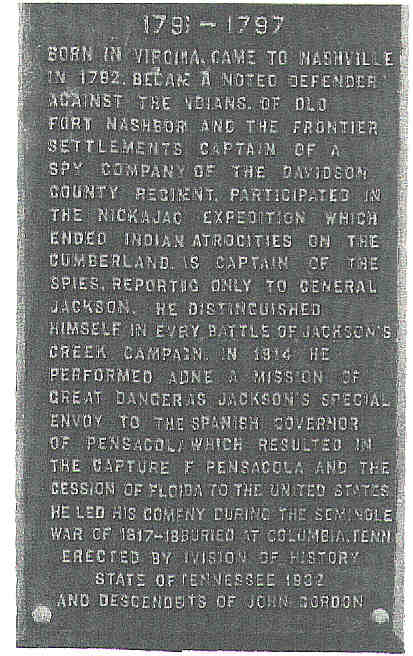|
Welcome!
The John Gordon House, located near the Duck River on the line adjoining Hickman and Maury counties of Tennessee, was the home of Captain John Gordon, famed Indian fighter. It was one of the first private brick dwellings within a thirty-mile radius on the Natchez Trace. Captain Gordon was awarded large grants of land by the government in recognition of his services. On part of his land, near the Duck River, he built this home, reputed to have been one of the finest in the country. |
 |
Life of an Indian Fighter
Capt. John Gordon, born in 1763 near Fredericksburg, Virginia, came to Nashville about 1782. In 1793, he was commissioned by Governor Blount of Tennessee to be a Captain of mounted infantry of the Davidson Couty regiment. In 1795, he was appointed a Justice of the Peace for Davidson County, and the next year was designated the first postmaster of Nashville. The pictured plaque below on the grounds of Nashville's old Post Office honors the man & his contributions to the survival of the Middle Tennessee settlement during its infancy. The Captain had a distinguished record for conspicuous service during the Coldwater & Nickajack expeditions in 1787 & 1794 against the renegade Cherokees who lived along the Tennessee River. During the years 1790-95, Gordon established himself as an Indian fighter, defending the Cumberland Settlement against attack from hostile Creek and Cherokee Indians. In 1801-02, when the army was widening and clearing the Natchez Trace from Nashville to Natchez, Mississippi, Gordon made an agreement with the Chickasaw chief, George Colbert, to operate a trading post and ferry on the Duck River, near the site of the home Mrs. Gordon would begin in 1817. After the treaty of 1805 when the Indians gave their lands in this area to the United States Government, Gordon received 640 acres on the Duck River from the Tennessee General Assembly in 1806. Sometime between 1808 and 1812, Gordon moved his family from Nashville to Duck River (nearby Gordonsburg is named for John Gordon). |
Captain John Gordon Home built 1818
|
During the Creek Indian Campaign of 1813-14, Gordon led a company of "spies" under General Andrew Jackson's command. After the war Gordon returned home, but joined with the military again in 1818 (when his home was completed) during the Seminole Indian Campaign. The house was built under the supervision of his wife, guided in this effort by general instructions in letters from her husband. Upon returning from the Seminole War in 1818, Gordon lived in his new house less than a year before his death in 1819 of pneumonia, leaving his wife and a large family. His body is laid to rest in Columbia, Tennessee's Historic Rose Hill Cemetery.
Gordon's house, ferry, and trading post stood near the Old Natchez Trace, a primitive Indian trail which was the main highway to the Old Southwest from the mid-1780's to 1830. Gordon operated his commercial enterprise where the Trace crossed the Duck River, when the legendary figures of Andrew Jackson, Sam Houston, Davy Crockett (and assorted types of boatmen, merchants, soldiers, murderers, thieves, ect. traveled the historic route until the advent of the steamboat in the middle 1810's.
The original house undoubtedly had numerous outbuildings designed for agricultural purposes; however, none of these survived to present time. A framed front porch and eight frame outbuildings dating from circa 1900 were removed by the National Park Service in 1978. Initial stabilizations and rehabilitation of the house was also undertaken at this time. Future plans call for the exterior of the house to be restored and maintained as nearly as possible to their original 1818-19 appearance.
|

Captain John Gordon (1763-1819)
|
|
|
